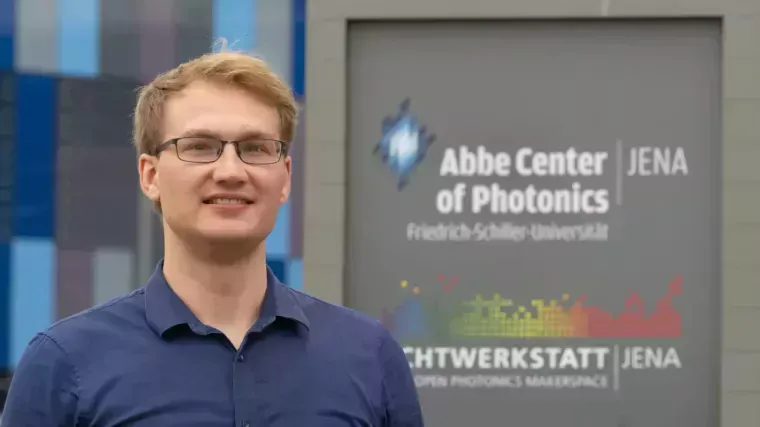
- Light
Published: | By: Ira Winkler, English translation by Gleb Chupakhin
The Beutenberg Campus e.V. has awarded ACP principal scientist Tobias Vogl with this year’s Young Scientist prize. The leader of the "Integrated Quantum Systems" research group was honored for the exceptional quality of his scientific work, which can be seen in the remarkable milestones he has achieved despite his young age of 31:Besides securing third-party funding of over 7.5 million euros and publishing numerous papers in prestigious journals such as Nature Physics and Nature Communications, Dr. Vogl currently supervises eight doctoral students, three master's theses, and leads two postdocs. He is also actively involved in teaching activities at the Faculty of Physics and Astronomy.
Vogl joined the ACP in 2019 as a postdoctoral researcher after completing his Ph.D. at the Australian National University. During his doctoral studies, he focused on developing room-temperature quantum emitters from the 2D material hexagonal boron nitride and optimizing them for applications in modern quantum technology. To explore potential areas of application, the emitters were directly coupled to optical fibers (for quantum networking, for example). Vogl's most significant achievement has perhaps been the coupling of an emitter to a microresonator. He integrated this resonator-coupled light source into a prototype of a small satellite. The goal was not only to ensure the radiation tolerance of quantum emitters, for example for satellite-based quantum communication; more importantly, this work qualified 2D materials for space applications in general. "This includes, for example, atomically thin field-effect transistors that could make future satellite electronics more efficient and lightweight," explains Tobias Vogl.
Nanoscale Quantum Sensors in Medical Diagnostics
Already in his first year as a postdoc in Jena, he successfully secured an independent DFG project in which he developed a novel excitation mechanism for single-photon sources and explored their application in quantum cryptography. In 2020, he began building an international research consortium with the goal of advancing single-photon sources for a global quantum internet. In 2021, Tobias Vogl received the INNOspace Masters Award from the German Aerospace Center, endowed with 400,000 euros, for his concept of optical quantum logic on a satellite.
In 2022, Tobias Vogl secured a junior research group funded by the German Federal Ministry of Education and Research (BMBF) which combined single-photon emitters in 2D materials with integrated optics. "This enables us to miniaturize complete quantum optical setups, which were previously realized on laboratory tables, into small quantum photonic chips," explains Vogl. These nanoscale quantum sensors are highly compact yet more precise than currently available solutions. As a result, they have enormous potential for applications in the life sciences. The magnetic field sensors could improve the precision and resolution of medical magnetic resonance imaging (MRI) scanners and be used as portable devices in an ambulance, for example.